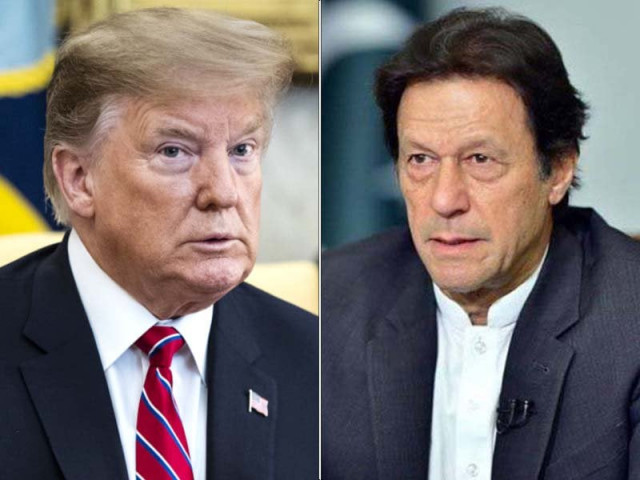Trump-Imran summit
An indication of US' softened stance towards Pakistan

A collage of Prime Minister Imran Khan and US President Donald Trump. PHOTO: FILE
He subsequently suspended the entire security assistance to Pakistan, once again reinforcing the perception that the two countries could never be natural allies.
The election of Imran Khan as Prime Minister added a new dimension to the already tricky ties given the fact that like Trump, Imran is also being seen as an unconventional politician. And that was on display in November last year when Trump and Imran had a war of words on Twitter. It was triggered by Trump’s diatribe against Pakistan. He reiterated his allegations that Pakistan had done ‘nothing’ for the US despite receiving ‘billions of dollars’ in aid. But the Pakistani Prime Minister hit back at Trump by calling his assertions as ‘false.’ “He [Trump] needs to be informed about historical facts. Pakistan has suffered enough fighting US’ war. Now we will do what is best for our people and our interests,” he responded to the Trump’s claims. The public spat between the two leaders further dented hopes of any reset in ties between Pakistan and the US.
But then there is Afghanistan where the US has been struggling to bring peace and ensure an honourable exit. To succeed in this endeavour, the Trump administration needed Pakistan’s support. It was because of this reason that despite adopting a hardline stance towards Pakistan, Trump had to write a letter to Prime Minister Imran seeking his help in bringing the Taliban to the negotiating table. Imran did respond to Trump’s request positively as Pakistan was able to convince the Taliban to hold direct talks with the US government first in the United Arab Emirates (UAE) and then in Doha. Negotiations are underway with reports of significant progress. The only trouble at the moment is the Taliban’s refusal to hold direct talks with the Afghan government. Another obstacle is insurgents’ resistance to agree on a ceasefire.
Nevertheless, Trump’s invitation to Prime Minister Imran for a visit suggests that his administration is apparently satisfied with the steps Pakistan has taken to facilitate the peace deal in Afghanistan. The recent US move to declare the Balochistan Liberation Army (BLA) a global terrorist outfit is also seen as acknowledgement of Pakistan’s ‘positive role.’ The IMF Executive Board’s approval of six billion dollar bailout package is another indication that the US may have softened its stance towards Pakistan.
Against this backdrop, the upcoming meeting between the two leaders would be very significant. The Foreign Office said the agenda was still being worked out but added the visit was meant to ‘refresh ties.’
If the two leaders are able to reset the fragile relationship, this will certainly be a good omen for Pakistan. Improved relationship between the two countries can greatly benefit Pakistan, which is in desperate need of US support to avoid being blacklisted when the Financial Action Task Force (FATF) will meet in October in Paris to review Islamabad’s case.
The challenge for Prime Minister Imran, though, is: can he neutralise hawks within the Trump administration who view Pakistan through the Indian lens?
Published in The Express Tribune, July 08th, 2019.
Like Opinion & Editorial on Facebook, follow @ETOpEd on Twitter to receive all updates on all our daily pieces.















COMMENTS
Comments are moderated and generally will be posted if they are on-topic and not abusive.
For more information, please see our Comments FAQ